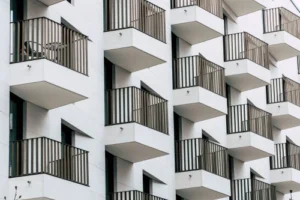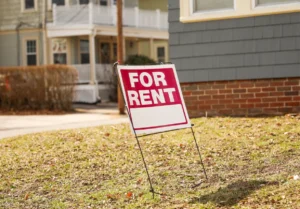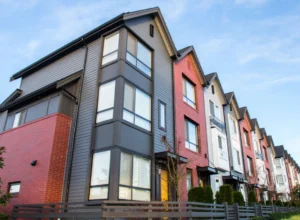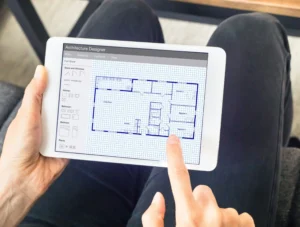Ensuring tenant retention is crucial for rental properties.

Why Is Tenant Retention Essential for Rental Properties?
Ensuring tenant retention is crucial for rental properties. It decreases vacancies, lowers turnover costs, secures a reliable rental income, and cultivates a positive community where tenants take better care of the property. By focusing on tenant retention, you can boost profitability and stability in property management.
Addressing maintenance promptly, offering incentives, and using technology can enhance tenant satisfaction. Ensuring a safe environment, having a renters insurance program, and providing incentives further solidify tenant relationships. These strategies lead to long-term success.
Key Takeaways
- Reduces turnover costs and vacancies
- Guarantees stable rental income
- Builds positive rental community
- Enhances property care and reputation
- Facilitates effective property management strategies
Importance of Tenant Retention
Reducing vacancy rates and turnover costs, as well as fostering a sense of community, emphasize the critical importance of tenant retention in rental properties. Proactive tenant retention strategies not only guarantee a stable rental income stream but also contribute to building a positive and thriving rental community.
When tenants stay for extended periods, they become invested in the property, creating a sense of belonging that translates into better care for the space they inhabit.
Effective communication plays a pivotal role in tenant retention. Regularly engaging with tenants, addressing their concerns promptly, and making them feel valued can greatly impact their decision to renew their lease. By establishing open lines of communication, property managers can build trust with tenants, leading to longer and more fruitful rental agreements.
Moreover, reducing tenant turnover directly impacts the property’s bottom line. Every turnover comes with costs associated with advertising the property, screening new tenants, and potential vacancy periods. By focusing on tenant retention, property managers can save on these expenses and ensure a consistent flow of rental income.
Ultimately, prioritizing tenant retention not only fosters a sense of community but also contributes to the overall success and profitability of rental properties.
Calculating Tenant Retention Rate
Calculating the tenant retention rate is a fundamental aspect of evaluating the success of your rental property management strategies. To determine the retention rate, you need to divide the number of lease renewals by the total number of tenants and then multiply the result by 100. For instance, if 65 out of 80 tenants renewed their leases, the retention rate would be 81.25%.
By monitoring these metrics, you gain insights into trends and can refine your retention strategies accordingly. Utilizing reporting features in specialized software can help you visualize retention rates over time, making it easier to identify patterns and make informed decisions.
Evaluating tenant retention is essential for the overall success of your rental property. Tracking lease renewal rates allows you to gauge how well you are retaining tenants and can indicate the effectiveness of your management practices.
By staying on top of these metrics, you can proactively address any issues that may arise and work towards improving tenant satisfaction and loyalty. Remember, understanding and optimizing your tenant retention rate is key to long-term success in property management.
Monitoring Tenant Retention Rates
Monitoring tenant retention rates is an essential practice for property managers to assess the effectiveness of their tenant retention strategies and secure long-term success in rental property management. By tracking tenant retention rates, which are calculated by dividing the number of lease renewals by the total number of tenants and multiplying by 100, property managers can evaluate the success of their efforts over specific periods. This monitoring process enables the identification of trends, allowing for necessary improvements to enhance tenant satisfaction.
Utilizing software reporting features can aid in visualizing retention rates over time, providing a clearer picture for analysis. Property managers can explore the data, understand patterns, and make informed decisions to optimize their retention strategies further. Maintaining a high tenant retention rate is vital as it directly impacts turnover costs and ensures stable rental income.
By actively monitoring and analyzing tenant retention rates, property managers can strategically manage their properties, reduce turnover, and cultivate long-lasting tenant relationships, ultimately leading to a more successful rental property venture.
Tenant Retention Strategies
Implementing effective tenant retention strategies is vital for property managers looking to maintain high occupancy rates and foster long-term tenant relationships. One key strategy is addressing maintenance requests promptly. By ensuring that maintenance issues are resolved in a timely manner, you can improve tenant satisfaction and increase retention rates.
Additionally, offering tenant incentives such as discounted rent or additional amenities can motivate tenants to renew their leases. These incentives not only show appreciation for current tenants but also encourage them to continue renting from you.
Regular communication and feedback with tenants are essential for building positive landlord-tenant relationships. Keeping an open line of communication allows tenants to express any concerns or feedback they may have, making them feel heard and valued.
Providing quality amenities and maintaining property conditions also play a significant role in tenant retention. When tenants feel proud of their living environment, they are more likely to stay long term.
Utilizing property management software can streamline interactions with tenants, making processes like communication and online rent payments more efficient. Taking a proactive approach to tenant retention by incorporating these effective strategies can help boost your tenant retention rate and overall property satisfaction.
Technology for Tenant Retention
Property management software plays a pivotal role in enhancing tenant retention by modernizing communication channels and offering convenient online rent payment solutions. Leveraging good property management software enables property managers to implement effective tenant retention strategies through a tenant portal that facilitates robust tenant communication.
By utilizing efficient technology tools, property managers can provide personalized services tailored to individual tenant preferences, ultimately boosting tenant satisfaction and loyalty.
Proactive property management involves utilizing technology to track lease dates and tenant preferences, allowing for a more personalized approach in delivering services. This level of customization not only enhances tenant satisfaction but also contributes to reducing turnover costs associated with acquiring new tenants. The seamless integration of technology in property management services fosters positive landlord-tenant relationships, enriching the tenant experience and solidifying tenant retention rates.
Incorporating technology into property management practices not only streamlines operations but also enhances overall efficiency, leading to improved tenant satisfaction and retention. By investing in robust property management software and utilizing efficient technology tools, property managers can create a seamless tenant experience that encourages long-term tenancy and reduces turnover costs.
Resident Benefits Package
Improve your tenants’ living experience with a thorough Resident Benefits Package. This package offers exclusive perks and services aimed at enhancing your tenants’ stay in your rental property. From access to fitness centers and pet care services to convenient package delivery and engaging community events, a well-rounded Resident Benefits Package can greatly elevate their living experience.
In a competitive rental market, offering a Resident Benefits Package can be a game-changer. By providing these extra amenities, you set your property apart and demonstrate a commitment to tenant satisfaction and well-being. This, in turn, can lead to increased tenant loyalty and higher retention rates, ultimately benefiting your rental property in the long run.
Prompt Maintenance Response
Enhance tenant satisfaction and loyalty by ensuring a prompt response to maintenance requests. When maintenance issues arise, tenants value a quick resolution to uphold a comfortable living environment. Prompt maintenance response not only prevents minor problems from escalating into major issues but also plays a crucial role in fostering positive landlord-tenant relationships.
Efficiently addressing maintenance requests showcases your commitment to providing a habitable space for your tenants. Delayed responses can lead to tenant frustration and dissatisfaction, potentially resulting in lease non-renewals. By prioritizing prompt maintenance resolution, you demonstrate your dedication to the well-being of your tenants, which in turn strengthens tenant loyalty.
Creating a system that allows tenants to easily report maintenance issues and ensuring timely follow-up on these requests can significantly impact tenant satisfaction levels. Tenants who feel valued and heard are more likely to develop positive relationships with their landlords, leading to a higher likelihood of lease renewals and recommendations to others seeking rental properties. Remember, a proactive approach to maintenance not only benefits your tenants but also contributes to the overall success of your rental property business.
Renters Insurance Program
Consider implementing a renters insurance program to provide financial protection for both tenants and landlords in case of unexpected events. Renters insurance programs offer a safety net for tenants by covering personal belongings, liability protection, and additional living expenses in the event of displacement due to unforeseen incidents like theft or damage. By recommending or requiring tenants to purchase renters insurance, landlords can reduce their liability in situations where tenant-caused damages occur. This proactive approach not only safeguards tenants’ assets but also provides peace of mind for both parties involved.
Having a renters insurance program in place not only benefits tenants by ensuring their personal belongings are protected but also serves as a valuable risk management tool for landlords. In the unfortunate event of unforeseen circumstances, such as a fire or burglary, renters insurance can provide financial protection that extends beyond the physical property.
This added layer of security not only fosters tenant retention but also strengthens the landlord-tenant relationship by offering a sense of security and stability. Overall, incorporating a renters insurance program can greatly contribute to the overall well-being and satisfaction of both tenants and landlords.
Security Focus
Implementing a security-focused approach in rental properties is essential for ensuring tenant safety and satisfaction. By conducting regular inspections and implementing robust security measures, property managers can effectively prevent potential threats and create a secure living environment for tenants. Additionally, providing on-demand pest control services adds an extra layer of security and comfort for residents.
A strong security focus not only contributes to tenant retention but also plays a significant role in shaping the property’s reputation. Tenants are more likely to stay loyal to a rental property that prioritizes their safety and well-being. This emphasis on security not only fosters tenant loyalty but also helps in reducing turnover rates, ultimately leading to a more stable and prosperous rental business.
Properties that are known for their security measures and commitment to maintaining a safe environment tend to attract and retain tenants more effectively. By investing in security and continuously enhancing safety protocols, property managers can build a positive reputation that sets their rental properties apart from the competition. Remember, a secure living environment is a key factor in ensuring tenant satisfaction and long-term success in the rental property market.
Incentives and Rewards
To boost tenant loyalty and encourage lease renewals, offering incentives and rewards can be a highly effective strategy for rental property owners. By providing renewal incentives such as discounted rent, gift cards, or upgrades, you can motivate tenants to stay longer and solidify their commitment to your property. Additionally, implementing a rewards program for lease renewals can help cultivate a positive tenant-landlord relationship, showing tenants that their continued tenancy is valued and appreciated.
Not only do tenant incentives and rewards contribute to fostering tenant loyalty, but they also have tangible financial benefits for property owners. By reducing turnover costs associated with finding new tenants and preparing the property for move-in, you can increase profitability in the long run. Moreover, a well-executed rewards program can set your property apart from others, attracting quality tenants who are looking for a landlord that values and invests in tenant retention strategies.
Frequently Asked Questions
What Is the Meaning of Rent Retention?
Rent retention refers to the ability of a property to keep tenants in place. It’s vital for property success as it shows tenant satisfaction and leads to consistent income. By focusing on lease renewals, communication, and service improvements, you enhance tenant satisfaction, build relationships, and save costs associated with turnover. This long-term stability boosts property value and guarantees a steady income stream, making it essential for rental properties.
What Is a Good Tenant Retention Strategy for Any Property Manager Involves?
Boost tenant retention by blending communication consistency, lease renewals, and tenant satisfaction. Prioritize property maintenance, plan community events, offer rent incentives, and focus on relationship building. Collect feedback, resolve problems swiftly, and provide flexible lease terms. Engage tenants with personalized services and incentive programs to foster loyalty. By implementing these strategies, you can enhance tenant satisfaction and increase long-term lease renewals.
How Do You Calculate Tenant Retention Rate?
To calculate tenant retention rate, divide the number of lease renewals by the total number of tenants, then multiply by 100. Monitoring metrics and reporting features in software help track retention rates over time. Analyzing these figures is essential for evaluating the success of retention strategies, determining impact on tenant satisfaction, improving rental agreements, enhancing communication channels, gathering feedback, and maintaining the property effectively.
When Thinking About Tenant Retention and Owner Profits, a Property Manager Should?
When thinking about tenant retention and owner profits, a property manager should focus on financial benefits and tenant relationships. By maximizing owner satisfaction through proactive maintenance, personalized communication strategies, and lease renewal incentives, you can reduce tenant turnover and increase rental income. Prioritizing property improvements and timely maintenance requests fosters positive landlord-tenant relationships, leading to long-term tenants and higher profits. Enhancing tenant screening processes also plays an essential role in achieving these goals.
Conclusion
In summary, tenant retention is vital for rental properties as it guarantees a stable income stream and reduces turnover costs. By implementing effective strategies, monitoring retention rates, and utilizing technology, you can create a positive rental experience for tenants. Remember, just like a well-maintained property attracts good tenants, tenant retention leads to long-term success in the rental market. Keep your tenants happy and watch your property flourish like a well-tended garden.
Source: Multifamily Mentor













 Accessibility
Accessibility